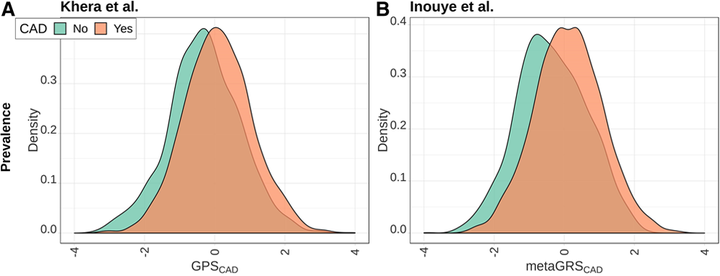Validation of Genome-Wide Polygenic Risk Scores for Coronary Artery Disease in French Canadians

Abstract
BACKGROUND: Coronary artery disease (CAD) represents one of the leading causes of morbidity and mortality worldwide. Given the healthcare risks and societal impacts associated with CAD, their clinical management would benefit from improved prevention and prediction tools. Polygenic risk scores (PRS) based on an individual’s genome sequence are emerging as potentially powerful biomarkers to predict the risk to develop CAD. Two recently derived genome-wide PRS have shown high specificity and sensitivity to identify CAD cases in European-ancestry participants from the UK Biobank. However, validation of the PRS predictive power and transferability in other populations is now required to support their clinical utility. METHODS: We calculated both PRS (GPSCAD and metaGRSCAD) in French-Canadian individuals from 3 cohorts totaling 3639 prevalent CAD cases and 7382 controls and tested their power to predict prevalent, incident, and recurrent CAD. We also estimated the impact of the founder French-Canadian familial hypercholesterolemia deletion ( LDLR delta >15 kb deletion) on CAD risk in one of these cohorts and used this estimate to calibrate the impact of the PRS. RESULTS: Our results confirm the ability of both PRS to predict prevalent CAD comparable to the original reports (area under the curve=0.72-0.89). Furthermore, the PRS identified about 6% to 7% of individuals at CAD risk similar to carriers of the LDLR delta >15 kb mutation, consistent with previous estimates. However, the PRS did not perform as well in predicting an incident or recurrent CAD (area under the curve=0.56-0.60), maybe because of confounding because 76% of the participants were on statin treatment. This result suggests that additional work is warranted to better understand how ascertainment biases and study design impact PRS for CAD. CONCLUSIONS: Collectively, our results confirm that novel, genome-wide PRS is able to predict CAD in French Canadians; with further improvements, this is likely to pave the way towards more targeted strategies to predict and prevent CAD-related adverse events.